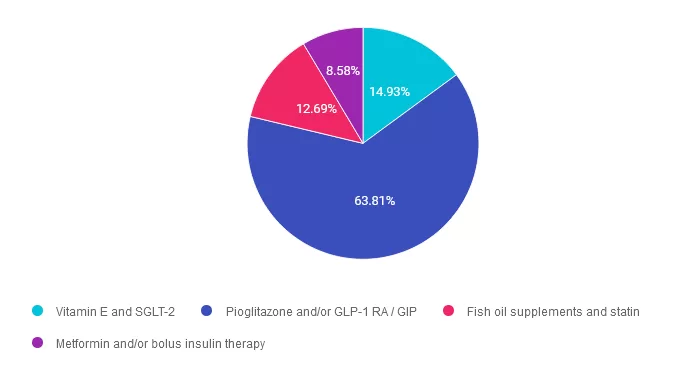For last week’s practice question, we quizzed participants on best meds to treat MASH. 64% of respondents chose the best answer. We want to clarify and share this important information, so you can pass it on to people living with diabetes and your colleagues, plus prepare for exam success!
Before we start though, if you don’t want any spoilers and haven’t tried the question yet, you can answer it below: Answer Question

Question: In the 2025 ADA Standards, they have updated the term Non-Alcoholic Steatohepatitis (NASH) to Metabolic Associated Steatohepatitis (MASH). They also recommend pharmacologic agents along with lifestyle interventions to treat people with diabetes and MASH.
Which of the following are the recommended diabetes medications to treat MASH?
Answer Choices:
- Vitamin E and SGLT-2
- Pioglitazone and/or GLP-1 RA / GIP
- Fish oil supplements and statin
- Metformin and/or bolus insulin therapy

Getting to the Best Answer
Answer 1 is incorrect. 14.93% chose this answer. “Vitamin E and SGLT-2.” While SGLT-2’s will help lower glucose levels and may result in some weight loss, the ADA does not recognize it as a treatment for steatosis. As far as Vitamin E, according to the ADA 2025 Standards, “it may be beneficial for the treatment of MASH in people without diabetes. However, in people with type 2 diabetes, vitamin E monotherapy was found to be ineffective in a small RCT, and it did not seem to enhance pioglitazone’s efficacy when used in combination, as reported in an earlier trial in this population.
Answer 2 is correct. 63.81% of you chose this answer. “Pioglitazone and/or GLP-1 RA / GIP.” GREAT JOB, this is the best answer. According to the ADA Standards In adults with type 2 diabetes with biopsy-proven MASH or those at high risk for liver fibrosis (based on noninvasive tests), pioglitazone, a GLP-1 RA, or a dual GIP and GLP-1 RA is preferred for glycemic management because of potential beneficial effects on MASH.
Answer 3 is incorrect. About 12.69% of respondents chose this. “Fish oil supplements and statin.” Part of this answer is correct. Based on the 2025 ADA Standards, “Statin therapy is safe in adults with type 2 diabetes and compensated cirrhosis from MASLD and should be initiated or continued for cardiovascular risk reduction as clinically indicated. In people with decompensated cirrhosis, statin therapy should be used with caution, and close monitoring is needed, given limited safety and efficacy data. However, the ADA does not recommend fish oil supplements to treat MASH.
Finally, Answer 4 is incorrect. 8.58% chose this answer. “Metformin and/or bolus insulin therapy.” Although metformin therapy and insulin are effective at addressing insulin resistance and lower glucose levels, they are not first line recommended agents to treat MASH.
We hope you appreciate this week’s rationale! Thank you so much for taking the time to answer our Question of the Week and participate in this fun learning activity!
Want to learn more about this question?
Join us for this upcoming webinar!
Test Taking Practice Exam Toolkit
Jan. 13th @ 11:30am PST

You are invited to join Coach Beverly for this FREE Webinar. And, if you want to have access to an additional 220+ sample practice online questions, you can purchase the complete Test Taking Toolkit.
For many of us, taking the certification exam is a nerve-wracking process
During this webinar, Coach Beverly will help you transform your nervousness into focused energy that will help you succeed. She will provide test-taking tips based on her experience taking the certification exam six times.
All hours earned count toward your CDCES Accreditation Information
Sign up for Diabetes Blog Bytes – we post weekly Blog Bytes that are informative and FREE! Every week we post one exam practice Question of the Week and Rationale of the Week. Sign up below!
The use of DES products does not guarantee the successful passage of the certification exam. CBDCE and ADCES do not endorse any preparatory or review materials for the CDCES or BC-ADM exams, except for those published by CBDCE & ADCES.









